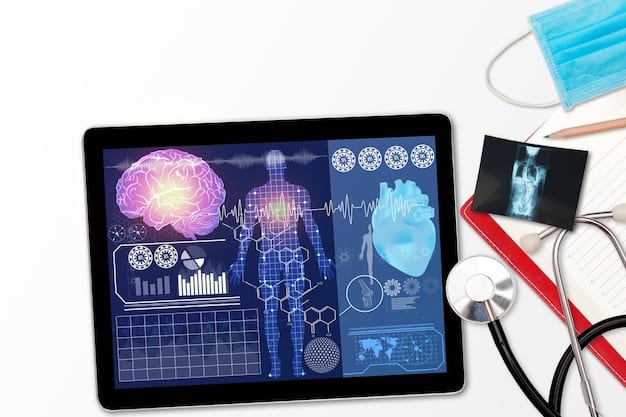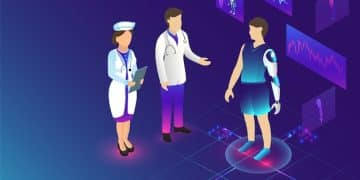US Healthcare Innovation: AI Startups Transforming Patient Care

US healthcare innovation is being revolutionized by AI startups that are developing cutting-edge technologies to improve patient care, streamline operations, and enhance healthcare outcomes across the United States.
The landscape of **US healthcare innovation: the latest AI startups transforming patient care** is rapidly evolving, driven by the increasing integration of artificial intelligence (AI) technologies. These startups are pioneering new approaches to diagnostics, treatment, and patient management, aiming to improve efficiency, reduce costs, and ultimately enhance the quality of care.
The Rise of AI in US Healthcare
Artificial intelligence is no longer a futuristic concept in healthcare; it’s a present-day reality. US healthcare is witnessing a surge in the adoption of AI technologies, fueled by the potential to address many challenges, from rising costs to workforce shortages and the need for more personalized care.
Addressing Healthcare Challenges with AI
AI offers a range of solutions to the pressing issues faced by the US healthcare system. By automating tasks, improving accuracy, and providing insights from vast amounts of data, AI is enabling healthcare providers to deliver better, more efficient care.
AI-Powered Automation
Many healthcare processes are repetitive and time-consuming. AI-powered automation can streamline administrative tasks, such as scheduling appointments, processing insurance claims, and managing patient records, freeing up healthcare professionals to focus on direct patient care.
- Improved Efficiency: AI-driven automation accelerates workflows, reducing the time spent on routine tasks.
- Reduced Errors: Automation minimizes the risk of human error in administrative processes.
- Cost Savings: By streamlining operations and reducing errors, automation can lead to significant cost savings for healthcare organizations.
The US healthcare system is increasingly embracing AI, marking a transformative shift towards more efficient and patient-centered care.

AI Startups Leading the Charge
Numerous AI startups are at the forefront of healthcare innovation in the US. These companies are developing groundbreaking technologies that are poised to transform various aspects of patient care, from diagnostics to drug discovery.
Early Detection and Diagnosis
AI algorithms can analyze medical images, such as X-rays, CT scans, and MRIs, to detect diseases in their early stages. This early detection can lead to more effective treatment and improved patient outcomes. These startups are at the leading edge:
Remote Patient Monitoring
AI-powered remote patient monitoring systems enable healthcare providers to track patients’ vital signs and health data remotely. This is particularly beneficial for patients with chronic conditions, allowing for early intervention and preventing costly hospitalizations.
- Continuous Monitoring: Real-time monitoring of patient health data.
- Early Intervention: Prompt detection of potential health issues, enabling timely intervention.
- Improved Patient Engagement: Patients feel more connected to their healthcare providers and more involved in their own care.
AI-driven remote monitoring is revolutionizing healthcare by enabling proactive and personalized care, ultimately improving patient outcomes and reducing healthcare costs.
AI in Drug Discovery and Personalized Medicine
AI is also playing a crucial role in drug discovery and personalized medicine. By analyzing vast amounts of genetic and clinical data, AI algorithms can identify potential drug targets and predict how patients will respond to different treatments.
Identifying Drug Targets
AI can accelerate the drug discovery process by identifying potential drug targets more quickly and efficiently than traditional methods. This can lead to the development of new and more effective treatments for a variety of diseases.
Predicting Treatment Response
AI algorithms can analyze a patient’s genetic profile and clinical history to predict how they will respond to different treatments. This allows healthcare providers to personalize treatment plans, ensuring that patients receive the most effective care.
- Personalized Treatment Plans: Tailoring treatments to individual patient characteristics.
- Reduced Side Effects: Minimizing adverse reactions by selecting the most appropriate treatments.
- Improved Treatment Outcomes: Enhancing the effectiveness of treatments through personalization.
AI’s role in drug discovery and personalized medicine is paving the way for a new era of healthcare, where treatments are tailored to each individual patient, leading to better outcomes and improved quality of life.

The Ethical Considerations of AI in Healthcare
As AI becomes more prevalent in healthcare, it’s essential to address the ethical considerations surrounding its use. These include concerns about data privacy, algorithmic bias, and the potential for job displacement.
Data Privacy and Security
AI systems rely on vast amounts of patient data, raising concerns about data privacy and security. Healthcare organizations must implement robust security measures to protect patient data from unauthorized access and misuse.
Algorithmic Bias
AI algorithms can be biased if they are trained on biased data. This can lead to disparities in care, with certain groups of patients receiving less effective treatment. It’s crucial to ensure that AI algorithms are fair and unbiased.
Addressing these ethical considerations is essential to ensure that AI is used responsibly and ethically in healthcare, benefiting all patients.
The Future of AI in US Healthcare
The future of AI in US healthcare is bright, with the potential for even more transformative applications. From AI-powered virtual assistants to robotic surgery, AI is poised to revolutionize every aspect of healthcare.
AI-Powered Virtual Assistants
AI-powered virtual assistants can provide patients with personalized support and guidance, answering questions, scheduling appointments, and reminding them to take medications. This can improve patient engagement and adherence to treatment plans.
Robotic Surgery
Robotic surgery allows surgeons to perform complex procedures with greater precision and control. This can lead to improved outcomes, reduced recovery times, and less pain for patients.
As AI continues to evolve, its impact on US healthcare will only grow, ushering in a new era of more efficient, personalized, and effective care.
Overcoming Barriers to AI Adoption
Despite the immense potential of AI in healthcare, several barriers hinder its widespread adoption. These include regulatory hurdles, a lack of interoperability between systems, and workforce training.
Regulatory Hurdles
The regulatory landscape for AI in healthcare is still evolving, creating uncertainty for startups and established healthcare organizations. Clear and consistent regulations are needed to promote innovation while ensuring patient safety.
Interoperability Challenges
Many healthcare systems struggle with interoperability, making it difficult to share data between different systems. This lack of interoperability can limit the effectiveness of AI algorithms, which rely on access to vast amounts of data.
Addressing these barriers is crucial to unlocking the full potential of AI in US healthcare.
| Key Point | Brief Description |
|---|---|
| ⚕️ AI in Diagnostics | Improving accuracy and speed of disease detection via image analysis and data mining. |
| 🤖 Automation of Tasks | Streamlining admistrative processes, reducing workload on healthcare providers. |
| 💊 Drug Discovery | Accelerating identification of drug targets and personalized medicine approaches. |
| 🔒 Ethical Implications | Addressing data privacy and algorithmic bias to ensure fair and equitable use. |
Frequently Asked Questions
▼
AI is improving diagnostics, streamlining operations, and personalizing treatments. It automates routine tasks, reduces errors, and provides insights from vast amounts of data to enhace healthcare delivery.
▼
The main benefits include increased efficiency, reduced costs, improved accuracy in diagnoses, and more personalized patient care. AI helps in early disease detection and remote patient monitoring.
▼
Key ethical concerns involve data privacy, algorithmic bias, and potential job displacement. Ensuring data security and fairness in AI algorithms is essential for responsible use.
▼
AI accelerates drug discovery by identifying potential drug targets, predicting treatment response, and analyzing large datasets to develop new and more effective treatments faster than tradional methods.
▼
The future includes AI-powered virtual assistants, robotic surgery, and further integration into telemedicine. AI will continue to evolve, enhancing the efficiency, personalization, and effectiveness of healthcare.
Conclusion
From revolutionizing diagnostics and drug discovery to streamlining operations and personalizing care, AI is transforming the US healthcare landscape, offering a multitude of benefits for patients, providers, and the healthcare system. Overcoming the current hurdles will unleash its full potential, leading to a healthier future for all.





